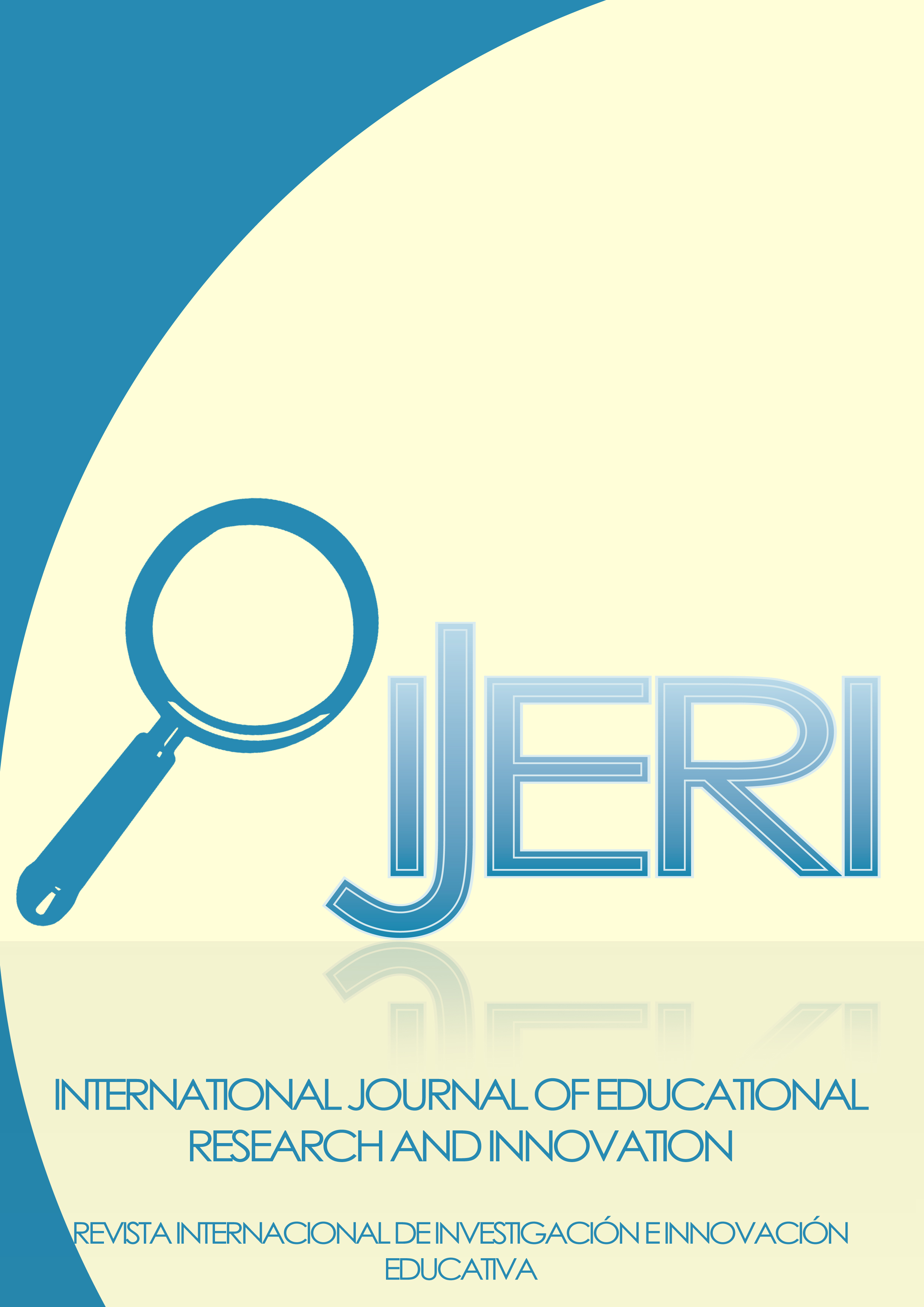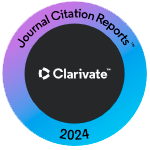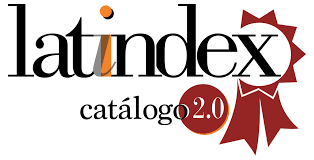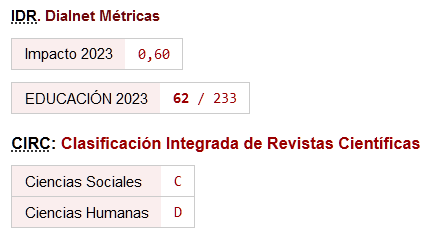Análisis de las competencias digitales docentes desde los marcos e instrumentos de evaluación
DOI:
https://doi.org/10.46661/ijeri.7444Palabras clave:
Capacitación académica, transformación digital docente, competencias tecnológicas, marcos competenciales, instrumentos de evaluaciónResumen
La tecnologización de la sociedad ha supuesto un gran reto para la educación del siglo XXI, viéndose ésta en la necesidad de afrontarlo para poder otorgar una alfabetización digital de calidad. Estos cambios acelerados repercuten en diversos ámbitos, entre ellos la profesionalización docente debido a las dificultades presentadas a la hora de actualizar sus conocimientos y adaptarse al vertiginoso ritmo tecnológico.
Las tecnologías digitales son actualmente indispensables en los entornos laborales, sociales, económicos, deportivos, artísticos, culturales, científicos y académicos constituyéndose como un elemento esencial para la capacitación académica y profesional. Todo ello, pone de manifiesto la necesidad de una transformación digital docente y la adquisición de competencias tecnológicas que respondan a los desafíos actuales y de esta forma ofrecer una formación integral para la vida, permitiendo la evolución en la era digital y abriendo caminos hacia nuevas prácticas pedagógicas, significativas e innovadoras.
El presente estudio se centra en analizar los diferentes marcos competenciales existentes necesarios para que el docente pueda desarrollarse a lo largo de su carrera profesional y personal, así como también la importancia de evaluar su nivel competencial y saber diagnosticar, de esta forma, las CDD adquiridas a través de diversos instrumentos de diferentes tipologías creados para ello.
Descargas
Citas
Alarcón, R., Jiménez, Elena., & Vicente-Yagüe, M.I. (2020). Development and validation of the dIGIGLo, a tool for assessing the digital competence of educators. British Journal of Educational Technology, 51(6), 2407–2421, doi:10.1111/bjet.12919.
Audrin, C., & Audrin, B. (2022). Key factors in digital literacy in learning and education: a systematic literature review using text mining. Education and Information Technologies 27, 7395–7419, https://doi.org/10.1007/s10639-021-10832-5.
Basilotta-Gómez-Pablos, V., Matarranz, M., Casado-Aranda, LA., & Otto, A. (2022). Teachers’ digital competencies in higher education: a systematic literature review. International Journal of Educcational Technology in Higher Education, 19(8), 1-16. https://doi.org/10.1186/s41239-021-00312-8
Bilbao-Aiastui, E., Arruti, A., & Carballedo, R. (2021). A systematic literature review about the level of digital competences defined by DigCompEdu in higher education. Aula Abierta, 50(4), 841-850, DOI: https://doi.org/10.17811/rifie.50.4.2021.841-850.
Buils, S., Esteve-Mon, F.M. Sánchez-Tarazaga, L., & Arroyo-Ainsa, P. (2022). Análisis de la perspectiva digital en los marcos de competencias docentes en Educación Superior en España. RIED-Revista Iberoamericana de Educación a Distancia, 25(2), 133-152. https://doi.org/10.5944/ried.25.1.32349.
Cabero-Almenara, J. y Palacios-Rodríguez, A. (2020). Marco Europeo de Competencia Digital Docente «DigCompEdu» y cuestionario «DigCompEdu Check- In». Edmetic, 9(1), 213-234. https://doi.org/10.21071/edmetic.v9i1.12462.
Cabero-Almenara, J. y Valencia, R. (2020). Y el Covid-19 transformó el sistema educativo. Reflexiones y experiencias por aprender. International Journal of Educational Research and Innovation, 15, 217-227.
Cabero-Almenara, J., Barragán-Sánchez, R., Palacios-Rodríguez, A., & Martín-Párraga, L. (2021). Design and Validation of t-MOOC for the Development of the Digital Competence of Non-University Teachers. Technologies, 9(4), 84.
Cabero-Almenara, J., Barroso-Osuna, J., Palacios-Rodríguez, A., & Llorente-Cejudo, C. (2020). Marcos de Competencias Digitales para docentes universitarios: su evaluación a través del coeficiente competencia experta. Revista Electrónica Interuniversitaria de Formación del Profesorado, 23(3), 17-34.
Cabero-Almenara, J., Barroso-Osuna, J., Palacios-Rodríguez, A. y Llorente-Cejudo, C. (2020). Marcos de Competencias Digitales para docentes universitarios: su evaluación a través del coeficiente competencia experta. Revista Electrónica Interuniversitaria de Formación del Profesorado, 23(2), 1-18.
Cabero-Almenara, J., Romero, R., Barroso, J. y Palacios, A. (2020). Marcos de competencias digitales docentes y su adecuación al profesorado universitario y no universitario. Revista Caribeña de Investigación Educativa, (RECIE), 4(2), 137-158.
Cateriano-Chavez, T. J., Rodríguez-Rios, M. L., Patiño-Abrego, E. L., Araujo-Castillo, R. L. y Villalba-Condori, K. O. (2021). Competencias digitales, metodología y evaluación en formadores de docentes. Campus Virtuales, 10(1), 153-162.
Çebi, A., & Reisoğlu, I. (2020). Digital Competence: A Study from the Perspective of Pre-service Teachers in Turkey. Journal of New Approaches in Educational Research, 9(2), 294-308. doi: 10.7821/naer.2020.7.583.
Cheng, S., Lu, L., Xie, K., & Vongkulluksn, V.W. (2020). Understanding teacher technology integration from expectancy-value perspectives. Teaching and Teacher Education, 91. doi: 10.1016/j.tate.2020.103062.
Consejo de la Unión Europea (2018). Recomendación del Consejo, de 22 de mayo de 2018, relativa a las competencias clave para el aprendizaje permanente. Diario Oficial de la Unión Europea, 22 de mayo.
Durán, M. (2019). Competencia Digital del Profesorado Universitario: Diseño y Validación de un Instrumento para la Certificación [tesis doctoral inédita, Universidad de Murcia: Escuela Internacional de Doctorado].
Durán, M., Gutiérrez. y Prendes, M.P. (2016a). Análisis conceptual de modelos de competencia digital del profesorado universitario. RELATEC, Revista Latinoamericana de Tecnología Educativa, 15(1), 97-114.
Durán, M., Gutiérrez. y Prendes, M.P. (2016b). Certificación de la Competencia TIC del Profesorado Universitario: Diseño y validación de un instrumento. Revista Mexicana de Investigación Educativa, 21(6), 527-556.
Fernández-Sánchez. M.R. & Silva-Quiroz, J. (2022). Evaluación de la competencia digital de futuros docentes desde una perspectiva de género. RIED-Revista Iberoamericana de Educación a Distancia, 25(2), 327-346. https://doi.org/10.5944/ried.25.2.32128.
Ferrari, A. (2012). Digital competence in practice: An analysis of frameworks. Luxembourg: Publications Office of the European Union. https://doi.org/10.2791/82116.
Gallardo, E. Poma, A. y Esteve, F. (2018). La competencia digital: análisis de una experiencia en el contexto universitario. Academicus, 1 (12), 6-15.
Garzón, E. Sola, T., Ortega, J. Marín, J., & Gómez, G. (2020). Teacher training in lifelong learning. The importance of digital competence in the encouragement of teaching innovation. Sustainability, 12, 28-52. https://doi.org/10.3390/su12072852.
Ghomi, M., & Redecker, C. (2018). Digital Competence of Educators (DigCompEdu): Development and Evaluation of a Self-Assessment Instrument for Teachers’ Digital Competence. Joint Research Center.
González-Sanmamed, Mercedes, S. Albert., & Muñoz-Carril, P. (2017). We can, we know how. But do we want to? Teaching attitudes towards ICT based on the level of technology integration in schools. Technology, Pedagogy and Education. doi: 10.1080/1475939X.2017.1313775
Guillén-Gámez, D., Ruiz-Palmero, J., Sánchez-Rivas, E., & Colomo-Magaña, E. (2020). ICT resources for research: an ANOVA analysis on the digital research skills of higher education teachers comparing the areas of knowledge within each gender. Education and Information Technologies, doi: 10.1007/s10639-020-10176-6
Ilomaki, L., Paavola, S., Lakkala, M., & Kantosalo, A. (2016). Digital competence-an emergent boundary concept for policy and educational research. Education and Information Technologies, 21(3), 655–679. https://doi.org/10.1007/s10639-014-9346-4.
INTEF. (2018). Portafolio de la competencia digital docente. http://enlinea.intef.es/courses/course-v1:SPOOC-INTEF+PortfolioCDD+2018_ED1/about.
INTEF. (2022). Marco de Referencia de la Competencia Digital Docente. Enero 2022. Madrid: Instituto Nacional de Tecnologías Educativas y Formación del Profesorado.
Lucas, M., Bem-Haja, P., Siddiq, F., Moreira, A., & Redecker, Ch. (2021). The relation between in-service teachers' digital competence and personal and contextual factors: What matters most? Computers & Education, 160, 104052, doi.org/10.1016/j.compedu.2020.104052.
Martín-Párraga, L., Llorente-Cejudo, C., & Barroso-Osuna, J. (2022). Validation of the DigCompEdu Check-in Questionnaire through Structural Equations: A Study at a University in Peru. Educ. Sci. 12, 574. https://doi.org/10.3390/educsci12080574
Mattar, J., Ramos, D.K., & Lucas, M.R. (2022). DigComp-Based Digital competence Assessment Tools: Literature Review and Instrument Analysis. Education and Information Technologies, 1-25.
Mesa, J. y Cedeño, G. (2020). Escala de medición del nivel de profesionalización pedagógica en la elaboración de medios didácticos sustentados en las TIC. Mikarimin. Revista Científica Multidisciplinaria, 6 (3), 117-131.
Morales-Almeida, P., Escandell-Bermúdez, M. y Castro-Sánchez, J. (2018). Formación del profesorado en TIC y su pensamiento acerca de la integración de la tecnología en la enseñanza de adultos. Profesorado. Revista de Currículum y Formación de Profesorado, vol. 22, 1, 541–560.
Nieto, E., Pech, S. y Callejas, A. (2017). Evaluación de la competencia digital docente. TIC y enseñanza de idiomas. En Sumozas, R. y Nieto, E. (coords.). Evaluación de la competencia digital docente, 17-33.
NMC-New Media Consoritum (2017). NMC horizon report: 2017 higher education https ://www.nmc.org/publi catio n/nmc-horiz on-repor t-2017-highe r-education-editi on/.
Padilla, A., Gámiz, V. y Romero, M.A. (2019). Validación del contenido de un guion de entrevista sobre la competencia digital docente en Educación Superior. Revista lbérica de Sistemas e Tecnologias de Informação, 32(6), 1-16.
Padilla-Hernández, A., Gámiz-Sánchez, V., & Romero-López, M. (2020). Evolution of higher education teachers’ digital competence: Critical incidents derived from life stories. Educar, 56(1), 109-127. doi: 10.5565/ rev/educar.1088.
Pinto, A., Pérez Garcías, A., & Darder, A. (2022). Development of teaching digital competence in initial teacher training: A systematic review. World Journal on Educational Technology: Current Issues. 14(1), 01-15. ttps://doi.org/10.18844/wjet.v14i1.6250.
Portillo-Berasaluce, J., Romero, A. y Tejada, E. (2022). Competencia Digital Docente en el País Vasco durante la pandemia del COVID-19. Revista Latinoamericana de Tecnología Educativa, 21(1), 57-73, https://doi.org/10.17398/1695-288X.21.1.57.
Prendes, M.P., García, P.A., & Montiel, F.J. (2021). EmDigital. Competencias para el emprendimiento digital de los estudiantes universitarios. Murcia: Grupo de Investigación en Tecnología ERducativa de la Universidad de Murcia
Redecker, C., & Punie, Y. (2017). European framework for the digital competence of educators: DigCompEdu. In Joint Research Centre (JRC) Science for Policy report. https://doi.org/10.2760/159770.
Reisoglu, I., & Çebi, A. (2020). How can the digital competences of pre-service teachers be developed? Examining a case study through the lens of DigComp and DigCompEdu. Computers & Education, 156, https://doi.org/10.1016/j.compedu.2020.103940.
Rodríguez- García, A. M., Raso- Sánchez, F. y Ruiz- Palmero, J. (2019a). Competencia digital, educación superior y formación del profesorado: un estudio de meta-análisis en la Web of Science. Pixel-Bit, Revista de Medios y Educación, 54,4, 65-81.
Rodríguez-García, A., Trujillo, J.M. y Sánchez, J. (2019b). Impacto de la productividad científica sobre competencia digital de los futuros docentes: aproximación bibliométrica en Scopus y Web of Science. Revista Complutense de Educación, 30(2), 623-646. http://dx.doi.org/10.5209/RCED.58862.
Salazar, E., & Juárez, L. G. (2019). Construct validity and reliability of a rubric to evaluate digital competencies from the socioformative approach (REDCS). [Construir la validez y confiabilidad de una rúbrica para evaluar las competencias digitales desde el enfoque socioformativo (REDCS)]. Forhum International Journal of Social Sciences and Humanities, 1(1), 87–99. https://doi.org/10.35766/jf19118.
Tondeura, J. Aesaertb, K., Prestridge, S., & Consuegraa, E. (2018). A multilevel analysis of what matters in the training of pre-service teacher's ICT competencies. Computers & Education 122, 32–42. https://doi.org/10.1016/j.compedu.2018.03.002.
Torres Barzabal, M. L., Martínez Gimeno, A., Jaén Martínez, A. y Hermosilla Rodríguez, J. M. (2022). La percepción del profesorado de la Universidad Pablo de Olavide sobre su Competencia Digital Docente. Píxel-Bit. Revista de Medios y Educación, 63, 35–64. https://doi.org/10.12795/pixelbit.91943.
Tourón, J., Martín, D., Navarro, E., Pradas, S. y Iñigo, V. (2018). Validación de constructo de un instrumento para medir la Competencia digital docente de los profesores (Cdd). Revista Española de Pedagogía, 269, 25-54.
Trujillo, F. (2021). The school year 2020-2021 in Spain during the pandemic. Luxembourg: Publications Office of the European Union.
Usart, M., Lázaro. J.L., & Gisbert, M. (2021). Validation of a tool for self-evaluating teacher digital competence. Educación XX1, 24(1), 353-373. http://doi. org/10.5944/educXX1.27080
Descargas
Publicado
Cómo citar
Número
Sección
Licencia
Derechos de autor 2022 Lorena Martín Párraga, Carmen Llorente-Cejudo, Julio Cabero-Almenara

Esta obra está bajo una licencia internacional Creative Commons Atribución-NoComercial-SinDerivadas 4.0.











